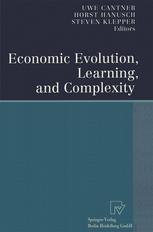

Most ebook files are in PDF format, so you can easily read them using various software such as Foxit Reader or directly on the Google Chrome browser.
Some ebook files are released by publishers in other formats such as .awz, .mobi, .epub, .fb2, etc. You may need to install specific software to read these formats on mobile/PC, such as Calibre.
Please read the tutorial at this link: https://ebookbell.com/faq
We offer FREE conversion to the popular formats you request; however, this may take some time. Therefore, right after payment, please email us, and we will try to provide the service as quickly as possible.
For some exceptional file formats or broken links (if any), please refrain from opening any disputes. Instead, email us first, and we will try to assist within a maximum of 6 hours.
EbookBell Team

4.8
74 reviewsThe twelve papers in this collection grew out of the workshop on "Eco nomic Evolution, Learning, and Complexity" held at the University of Augsburg, Augsburg, Germany on May 23-25, 1997. The Augsburg workshop was the second of two events in the Euroconference Series on Evolutionary Economics, the first of which was held in Athens, Greece in September 1993. A special issue of the Journal of Evolutionary Econo mics (1993(4)) edited by Yannis Katsoulacos on "Evolutionary and Neo classical Perspectives on Market Structure and Economic Growth" con tains selected papers from the Athens conference. The Athens conference explored neoclassical and evolutionary perspectives on technological competition and increasing returns. It helped to identify the dis tinguishing features of evolutionary scholarship. The Augsburg workshop was more oriented toward exploring methodological issues in evolutiona of the papers employed new me ry and related scholarship. A number thods, such as genetic programming and experimental analysis, some developed new econometric techniques or raised new empirical issues in evolutionary economics, and some relied on simulation techniques. Twelve papers covering a range of areas were selected for this collection. The papers address central issues in evolutionary and Schumpeterian accounts of industrial competition, learning, and innovation.